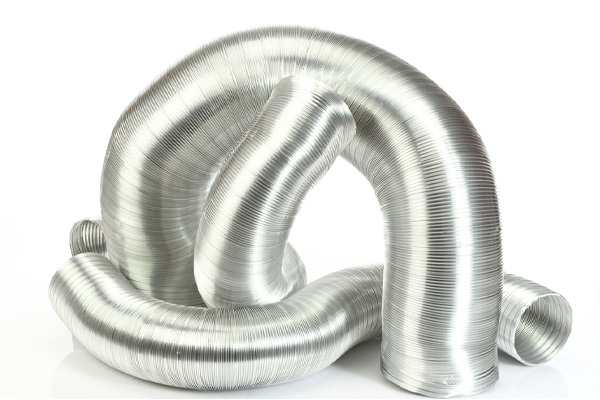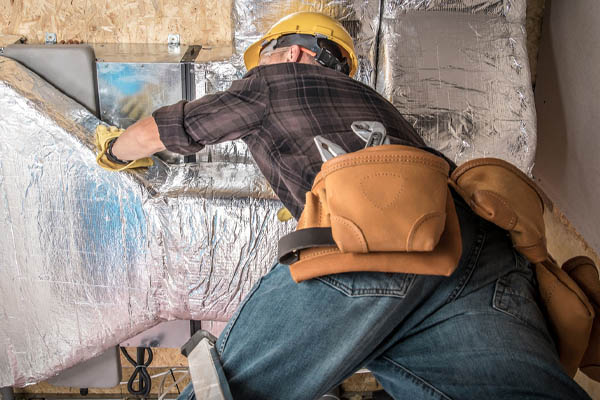How Long Does HVAC Ductwork Last?

Ductwork is a crucial part of HVAC systems. Ducts, like other parts, have a limited service life. The article discusses the factors affecting the ductwork’s longevity, such as installation techniques, maintenance habits, material quality, and environmental conditions. This assists you in making informed decisions regarding repairs or an HVAC ductwork replacement. Keep reading to learn these key factors and ensure optimal performance for a long time.
How Long Should Heating & Cooling Ductwork Last?
Contents
The service life of ductwork varies depending on several variables. Well-maintained ductwork can last from 15 to 25 years on average. However, this isn’t a definitive estimate. Different elements can affect the longevity of ducts. Factors like material quality, regular maintenance, environmental conditions, and installation techniques play significant roles.
Talk to an HVAC professional for a more accurate assessment of your ductwork’s condition. They can also guide you regarding the needed repairs or replacements.
Related Article: My Furnace Won’t Turn Off – Why?
Why HVAC Ductwork Is Important

Ductwork is crucial for your HVAC system to function properly. Listed below are some reasons HVAC ducts are vital:
- Air Distribution: The ductwork is a network of pathways circulating conditioned air from your HVAC unit to various areas of your home or office. This way, the warm or cold air can reach each room effectively, so your indoor environment stays comfortable.
- Airflow Regulation: The ducts let you regulate the airflow so there are consistent temperatures throughout your home. This means that hot or cold spots are prevented.
- Indoor Air Quality: HVAC ductwork helps maintain your home’s air quality. It has air filters that trap dust, pollutants, and allergens. This way, they don’t circulate throughout your indoor space. Remember that clean and well-maintained ducts help promote healthier indoor air.
- Energy Efficiency: Ducts that are efficiently designed and sealed reduce the energy as they prevent air from leaking. Leaky ducts can cause significant energy waste, minimizing your HVAC system’s overall efficiency. Correctly installed vents also help retain cold or warm air, reducing your HVAC system’s workload.
- Noise Control: Well-designed ducts help lower the noise transmission of your HVAC system. This is because you can install sound attenuators and insulation materials, so the airflow emits reduced noise.
Related Article: Tips on How to Protect Your HVAC Warranty
Factors That Impact HVAC Ductwork Lifespan

Here are several variables that can impact your HVAC ductwork’s lifespan:
- Material Quality: The quality of the material your ductwork is made of is crucial. Ducts made of high-quality materials, like aluminum, fiberglass, and galvanized steel, are likely to have extended lifespans than those made of lower-quality materials.
- Installation Techniques: Correct installation is essential for the ductwork’s longevity. When improperly installed, the ducts may suffer from premature failure, air leaks, and increased wear and tear. Examples of problems caused by improper installation are insufficient sealing and excess duct bending.
- Maintenance Practices: Regular maintenance is essential in prolonging your ductwork’s lifespan. Routine checkups, cleaning, and filter changes help prevent the buildup of mold, dust, and debris that can adversely impact your ductwork’s performance and durability.
- Environmental Conditions: Extreme temperatures, humidity, corrosive substance exposure, and other environmental factors can affect the ductwork lifespan. High humidity levels can encourage mold growth. Corrosive substances can cause duct deterioration over time.
- Usage and Load: How often you use your HVAC system and the load placed on the unit impact the ductwork’s lifespan. Systems that experience higher airflow levels or are heavily used may have more wear and tear, which tends to shorten the duct’s lifespan.
- Maintenance of Surrounding Areas: The condition of the spaces where the duct is placed also affects its longevity. Several ways to maintain the ductwork’s integrity include protection from pests and critters, preventing excess dust and debris, and proper installation.
Keep in mind that this isn’t an exhaustive list of factors, and your home’s circumstances may differ from the next house. Have HVAC professionals conduct regular maintenance to find any problems and make the necessary upkeep or replacement.
Related Article: Seek A Second Opinion Before Replacing Your HVAC System
Signs You Need Air Duct Replacement

Knowing when to replace your air ducts is important to ensure optimal HVAC performance. Here are several indicators you need to replace your air ducts:
- Age of Ductwork: Consider getting a replacement if your ducts are over 15 years old. Old ducts are more likely to deteriorate and have leaks. They may also have reduced efficiency.
- Visible Damage: Examine your ducts for cracks, gaps, holes, or other visible signs of damage. These problems can cause air leaks, resulting in reduced comfort and energy wastage.
- Inconsistent Airflow: Ductwork problems may cause uneven airflow in different areas of your home. Damaged, blocked, or leaky ducts can disrupt the balanced air circulation.
- Excessive Dust or Debris: Excess dust or debris buildup around the return vents or supply registers may mean leaks or breaches in your ducts. This causes poor indoor air quality and increased allergy symptoms.
- Mold and Mildew Growth: Mold or mildew can grow in ducts exposed to moisture or have insufficient insulation. Foul smells or visible growth around ducts mean you should replace them to prevent health risks.
- Rising Energy Bills: Leaky or improperly insulated ducts can cause significant energy losses. Your HVAC system will also work harder, and you’ll notice increased energy bills. If your energy costs suddenly have unexplainable spikes, it may be time to check your ducts.
- Noisy Operation: Odd noises like whistling, rattling, or banging from your ducts may mean problems with your system. Damaged or improperly sealed ducts can produce unusual noises and may need replacement.
Keep in mind that these signs act as a guideline. You should still consult an HVAC technician for a thorough check and accurate assessment of your unique ductwork condition.
Should You Opt For An HVAC Ductwork Replacement When Upgrading The HVAC System?

Several factors can help you determine whether to get a ductwork replacement when replacing your HVAC system. Here are several considerations to aid you in making an informed decision:
- Age and Condition: Consider your current duct’s age and condition. If your ducts are relatively new, free from major problems, and well-maintained, you may not have to replace the ducts when replacing the HVAC system.
- System Compatibility: Check if the existing ductwork and the new HVAC system are compatible. Different systems may require specific duct size, airflow capacity, or design. If your current ducts meet these requirements, you may not need to replace them.
- Efficiency and Airflow: Evaluate your current duct’s airflow and efficiency. Poorly insulated or leaky ductwork can significantly affect the system’s energy efficiency and overall performance. Replace the ducts to have better efficiency and proper airflow if they have inadequate insulation and major leaks.
- Cost Considerations: Consider the cost of ductwork replacement. Replacing ducts can add to the overall cost of replacing your HVAC system, but it may be a worthy investment. This is especially true if your current ductwork is poorly designed, in poor condition, and inefficient. Long-term energy savings and better comfort can outweigh the initial replacement cost.
- Future Plans: It is a good chance to replace your ductwork and your HVAC unit if you have home remodeling or expansion plans. This lets you better integrate your new system into the modified expanded space.
Related Article: When to Call Emergency HVAC Services
Conclusion
The average ductwork lifespan is 15 to 25 years. However, you should consult a professional to get an accurate assessment. HVAC technicians can inspect your ductwork’s condition, look for signs of deterioration, and give you expert advice on whether replacement or repair is needed. Their expertise helps homeowners and business owners to make informed decisions so their HVAC systems have optimal performance and efficiency for a long time.
Related Article: The Importance Of Home Air Sealing Your Home On Energy Costs
Call Point Bay Fuel For All Your HVAC Needs

Point Bay Fuel provides high-quality heating and cooling services in Ocean County and Monmouth County, New Jersey. We have professionally certified technicians who are experts in HVAC replacements, repairs, tune-ups, and replacements. We guarantee to always deliver top-quality services to all our clients.
Our company understands how important it is to have a comfortable and energy-efficient home. This is why we offer affordable prices for all our services. Our tune-ups can improve comfort and lower energy costs. Our knowledgeable techs can help you if you need an HVAC repair or replacement. They will always recommend the best solution while working within your budget.
Book a service appointment with Point Bay Fuel today. Call now for a hassle-free consultation. Trust Point Bay Fuel for superior HVAC services that will exceed your expectations!
Contact us now by calling (732) 349-5059 to speak to one of our home comfort specialists! Click the link to view our service area.
